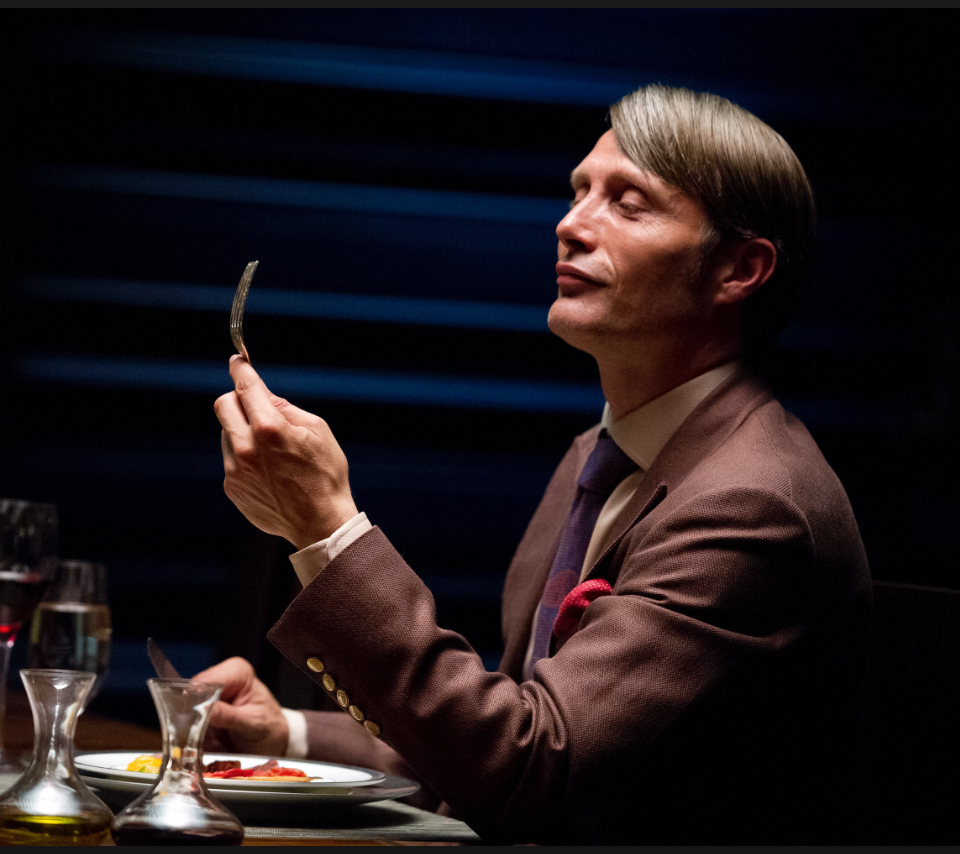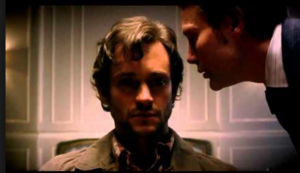 The following is a review I originally published in Word and Film.
The following is a review I originally published in Word and Film.
The season two finale of “Hannibal” airs May 23, and most of us have no clue how it will end even if we’ve read Thomas Harris’ Red Dragon, upon which the series is loosely based. That’s if we’ve been watching at all: The NBC show’s ratings have dipped perilously low though it’s been renewed it for another season.
Yet, aside from Sherlock Holmes, there may be no crime-novel figure who looms as large in our collective imagination as Hannibal Lecter does, and this show goes a long way toward explaining why. Like all of our most terrifying dreams, “Hannibal” seduces us before grabbing us by the throat. Ironically, that seduction relies mightily upon a moral and narrative ambiguity that also may be alienating audiences.
In the movies adapted from Harris’ books about the serial killer, Hannibal Lecter is larger-than-life – so much so that a little of him goes a long way. In 1986’s “Manhunter,” actor Brian Cox bases his portrayal less on the character’s literary antecedent than on the Scottish serial killer Peter Manuel. The effect is plenty chilling but more brutish than we might expect of an aesthete whose declared foe is bad taste. In “The Silence of the Lambs,” “Red Dragon,” and the unfortunate “Hannibal,” Anthony Hopkins’ iconic take is more refined but also so hammy that it’s only palatable in small doses (cannibalism metaphors apparently being irresistible in this context). It’s hard to, ahem, swallow that the doctor wouldn’t eat someone else alive for such showboating, quid pro quo. And let’s not discuss Gaspard Ulliel’s turn as the young Lecter in 2007’s unspeakably bad “Hannibal Rising”; Thomas Harris was reportedly bullied into writing this film and book by those who held the cinematic rights to the character.
Then there’s Mads Mikkelsen’s Hannibal in the eponymously titled NBC show, which swoops in and out of a fidelity to Harris’ books with a discombobulating, off-kilter elegance that is this series’ trademark. Initially, we’re bowled over by the sheer novelty of Mikkelsen’s pre-prison Hannibal, who is free to cross his unshackled legs in custom-tailored suits, leaf through carefully lettered recipe cards, butcher his extremely free-range meat. This Hannibal is relatively ordinary except for his extraordinary – wait for it – tastes. He is also relatively young and, with his full mouth and high cheekbones, matinee-idol handsome. All of this makes sense. Hannibal’s brand of evil – a sociopathy masquerading as mere snobbery – is more plausible in a man whose own visage pleases him more than those upon whom he gazes. More to the point, his visage pleases us as well. Good looks always prove awfully helpful in a seduction.
This Hannibal is relatively ordinary except for his extraordinary – wait for it – tastes. He is also relatively young and, with his full mouth and high cheekbones, matinee-idol handsome. All of this makes sense. Hannibal’s brand of evil – a sociopathy masquerading as mere snobbery – is more plausible in a man whose own visage pleases him more than those upon whom he gazes. More to the point, his visage pleases us as well. Good looks always prove awfully helpful in a seduction.
The true brilliance of this show lies in the cues it takes from Hannibal’s high aesthetic standards. With its chiaroscuro lighting, swelling string scores, and painterly opulence (referencing artists as diverse as Hieronymus Bosch and Gustav Klimt), “Hannibal” is so well crafted that it seduces us the same way Hannibal seduces everyone but his victims. We bask in all his flourishes – his mahogany interiors, gleaming cufflinks, still-lifes as meals (in the most ecstatic and repulsive of capacities, “Hannibal” is also a cooking show), and even his beautifully composed crime scenes. As we do, we grasp why everyone in Hannibal’s world is blind to his true nature. They want to be, so that they can continue drinking his good wine and mawing his good cuts of meat. Let’s face it: No one really likes to look into the eyes of what they’re eating, anyway.
I’m joking, of course, but only partly. Again and again, Hannibal kills those whom he deems guilty of an ugliness of some sort. “Whenever feasible, one should always try to eat the rude,” he pronounces drily. Many of the show’s most brutal scenes are so figurative, so hypnotically slo-mo, that we can scarcely discern what is transpiring, let alone resist the formal grandeur. This entails a dissociation so complete that it replicates the experience of a nightmare, albeit one from which we don’t wish to wake. “Hannibal” suggests that good taste can be the ultimate ringleader, so much so that we’ll willingly reinforce its status quo no matter how destructive it may be. (Who wouldn’t want to ogle Hannibal’s Pinterest board?)
Certainly in recent episodes, the radically empathic FBI crime consultant Will Graham (Hugh Dancy) has begun to dance a little too closely with Lecter, his therapist and colleague. Once abject enemies, the two are now locked in a psychic romance in which, under the guise of ensnaring the doctor, Graham feasts upon the villainy he is served. Literally. In between perfectly arranged tableaus of violence, the two engage in almost languorous chitchat about God, human nature, good, evil. At this point, it’s not even clear how good a guy the once-sympathetic Graham is. He’s done some terrible things while under Dr. Lecter’s treatment.
Really, no matter what takes place in tonight’s finale – no matter who takes down whom – we’ve already learned this season’s hardest lesson: Evil is less of a slippery slope than a spectrum on which we all may find ourselves. By beguiling us with Harris’ legendary serial killer, “Hannibal” has diagnosed its audience as immorally relativist. Judging from the series’ current ratings, that may be too bitter a pill for many to swallow. For some of us, though, it’s quite an acquired taste.
